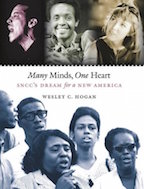 Duke University in Durham, North Carolina, has just debuted a new website documenting the struggle of the Student Nonviolent Coordinating Committee (SNCC) to secure voting rights for African Americans. The site, entitled “One Person, One Vote: The Legacy of the SNCC and the Fight for Voting Rights,” went live one week before the 50th anniversary of the “Bloody Sunday” voting rights march in Selma, Alabama on March 7, 1965.
Duke University in Durham, North Carolina, has just debuted a new website documenting the struggle of the Student Nonviolent Coordinating Committee (SNCC) to secure voting rights for African Americans. The site, entitled “One Person, One Vote: The Legacy of the SNCC and the Fight for Voting Rights,” went live one week before the 50th anniversary of the “Bloody Sunday” voting rights march in Selma, Alabama on March 7, 1965.
Students and faculty at Duke University worked with veterans of SNCC and other civil rights leaders to develop the website. The site includes a timeline, profiles of the key figures in the struggle to secure voting rights, and stories relating to the struggle.
 Wesley Hogan, the director of the Center for Documentary Studies at Duke University and the author of Many Minds, One Heart: SNCC’s Dream for a New America (University of North Carolina Press, 2007), stated that “this is an enormous achievement, to find ways to bring these experts who were so central to the voting rights struggle, into the formal historical record through their own words and on their own terms. The project comes at a moment when our nation is both commemorating key victories of the civil rights movement and seeing those victories challenged by new restrictive voting laws in many states.”
Wesley Hogan, the director of the Center for Documentary Studies at Duke University and the author of Many Minds, One Heart: SNCC’s Dream for a New America (University of North Carolina Press, 2007), stated that “this is an enormous achievement, to find ways to bring these experts who were so central to the voting rights struggle, into the formal historical record through their own words and on their own terms. The project comes at a moment when our nation is both commemorating key victories of the civil rights movement and seeing those victories challenged by new restrictive voting laws in many states.”
The video below discusses the new project.











It’s downright astonishing that another HWCU(Historically White College and University) called Duke University will be leading the charge telling Black history from a particular lens. In my view, no other group in this country allows anyone outside of that coethnic the privilege of telling “their story. Lets see how many Black historians from North Carolina Central University (NCCU), N.C. A&T State University, Bennett College, Johnson C. Smith University, Winston-Salem State University, St. Augustine University, Fayetteville State University or Shaw University will be intimately involved with this project.
Michael you are right: “It’s downright astonishing…” It is sad that “…Black historians from North Carolina Central University (NCCU), N.C. A&T State University, Bennett College, Johnson C. Smith University, Winston-Salem State University, St. Augustine University, Fayetteville State University or Shaw University” didn’t undertake a similar project. Perhaps, they did!
I first saw Dr. Martin L. King when he was speaking at White Rock Baptist Church ( the old White Rock which no longers stands in its spot but was torn down during urban renewal.) The church was packed and it was at that church that the sit-in for Woolworth was organized. These sit-ins were before the Greensboro sit-ins. I proudly sat at the lunch counter while a white man paced the floor behind me saying “I do not want to die and I do not want to be torched. He was chewing tobacco and spitting on the Woolworth floor as he paced behind those, including me who sat at the lunch counter. This Woolworth was located on the corner and main street in Durham, NC.